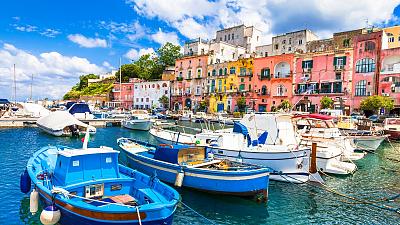Italy’s islands push ‘Covid-free’ brand to revive tourism

Rome: In attempt to lure holidayers and revive pandemic-struck tourism, Italy is exploiting a ‘Covid-Free Islands’ strategy.
Local authorities have launched mass vaccination campaigns of islanders – set to be completed between the end of May and mid-June, just in time to welcome again global holiday-makers for summer.
A total of 30 remote atolls will be the first ones to reach full herd immunity. This ‘vaccine rush’ began at the end of April, and so far nine of Italy’s most attractive holiday-making islands are now Covid-free.
Italy is finally exiting from the pandemic by speeding up vaccination, with a total of approximately 30 million Italians having been given their first dose.
But re-opening to tourism safely stands as the main challenge to relaunch the sector, which in pre-pandemic times accounted for 13 percent of Italy’s GDP.
“This is actually a reboot. We were forced to press pause, to shut down, and now we need to get back on our feet and face a new beginning”, said one ruling coalition government official.
Sicily is set to play a key role in the rebound, with the most of the smaller isles also involved in the Covid-free plan. They are usually a major summer hotspot, luring holiday-makers with centuries-old Italian history – plus beaches, the sea and virtually guaranteed good weather.
Manlio Messina, Sicily’s tourism councillor, says that all inhabitants of the region’s 14 minor islands will be vaccinated by the end of this week.
“The ‘Covid-free’ campaign is going speedily. On a daily basis across Sicily we’re vaccinating 56,000 people, and have the potential of reaching a target of 100,000 daily shots. Islands are our priority.”
“Safety controls at regional airports and port hubs have been strengthened, travellers in transit to our smaller islands will be required to show a green pass or get a Covid swab to prove they test negative”, says Messina.
The ‘Covid-free’ crusade has turned into a brand for the remote minor islands, with few crowds and where social distancing is guaranteed.
Vaccination has been completed on Ustica island, a scuba-diving centre off the coast of Palermo, and miniscule Linosa, Sicily’s southernmost isle close to Tunisian shores.
Messina says the Sicilian islands are extra safe because they’ve been “really Covid-free since the start of the pandemic, with zero cases among the local population, which just increases even more their charm for tourists looking for safe, pristine holiday spots”.
Four-out-of-seven islands in the Aeolian archipelago, a UNESCO-listed World Heritage destination, have succeeded in staying free of contagion since the beginning of the Coivd-19 outbreak, thanks to their remoteness. There have been no reported cases of contagion, nor quarantined residents, on the off-the-beaten-track volcanic isles of Filicudi, Alicudi, Stromboli and Panarea.
The isolation of these atolls is their biggest selling point – and what has kept them so far safe and healthy. Alicudi has no roads, only hundreds of stone steps and old mule paths. Filicudi features just one village, while Stromboli’s ancient fishing hamlet can only be reached by dinghy.
“The mass vaccination reinforces the safety of our islands. Currently 70-percent of the entire archipelago population has been inoculated, roughly 7,000 people out of a total 10,000, and the full target will be reached in coming days” according to Marco Giorgianni, mayor of the Aeolian islands.
Giorgianni argues a distinction must be made between “virgin islands that have kept clean and pure” throughout the pandemic and those that will be Covid-free only following vaccines, with the former deserving more credit.
In the bay of Naples, both upmarket Capri and its sister-isle Procida, which has been named Italy’s 2022 Culture Capital, have inoculated all islanders.
The same goes for Capraia island in Tuscany, La Maddalena in Sardinia and the Tremiti archipelago in the Adriatic sea. On its two inhabited islands of San Domino and San Nicola, the vaccination of barely 400 residents ended last week.
Tremiti mayor Antonio Fentini says hotels and restaurants are eager to welcome travellers again, and revive the tourism sector which has been lying “dormant” for more than a year.
Tremiti has been Covid-free, with no reported cases. Fentini points to the sea as a natural barrier of protection.
“My islands live off tourism, if you take that away from the equation what are we left with, how can our little economy survive? We can’t wait to get back to work. Everything is ready for visitors, the roads and hotels have been spruced up and we’ve been awarded the prestigious Blue Flag certification for our clear waters”, says Fentini.
Another well-known holiday island in the bay of Naples, Ischia, is expected to conclude vaccinations this weekend. Hotels in Ischia and Procida will feature a Covid-free badge at the entrance hall.
Other islands lagging slightly further behind in the schedule but aim to complete the mass inoculations by mid-June.
One is Ventotene off Rome’s coast, where Europe’s founding father Altiero Spinelli co-wrote the ‘Ventotene Manifesto’, the building block of the European Union.
“We’re doing the best we can but aren’t as fast as my colleagues in the Gulf of Naples. Hopefully we’ll get to the target over the next few weeks”, says Ventotene mayor Gerardo Santomauro. Barely 200 people live on the tiny isle, just two square-kilometers wide and flat as a pancake. In addition, a few mountain resorts as also aiming for Covid-free status to attract tourists who prefer trekking trails to beaches. But for now it’s just the Piedmont region involved in the plan, with 200 small Alpine villages vaccinating their residents.





